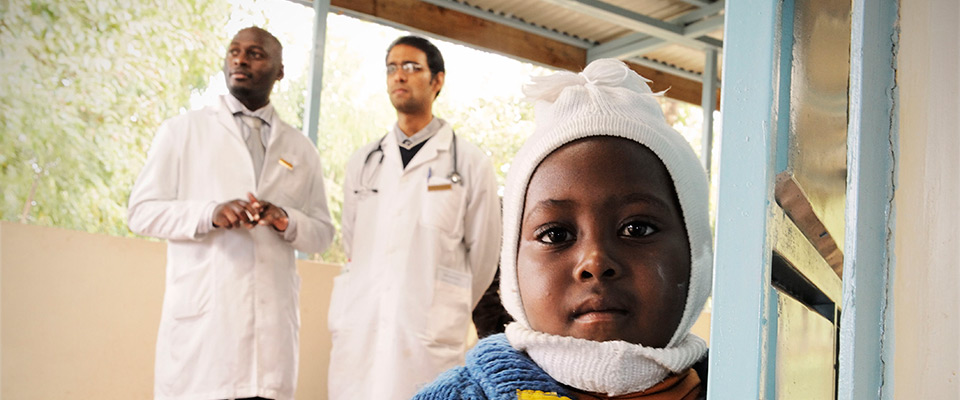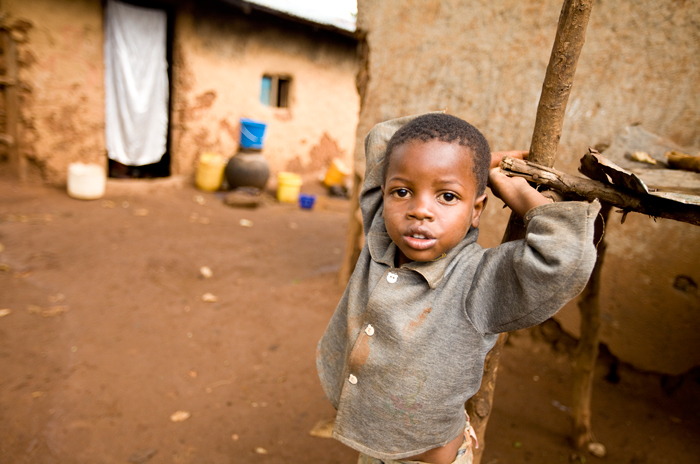- What We Do
- Agriculture and Food Security
- Democracy, Human Rights and Governance
- Economic Growth and Trade
- Education
- Ending Extreme Poverty
- Environment and Global Climate Change
- Gender Equality and Women's Empowerment
- Global Health
- Water and Sanitation
- Working in Crises and Conflict
- U.S. Global Development Lab

A child peers around the corner in the waiting room of the HIV Comprehensive Care Clinic of Meru District Hospital in Kenya’s Eastern province as two pediatricians stand in the background.
Mia Collis/EGPAF
International Cooperation and HIV and AIDS
At a Glance
A decade after the launch of the U.S. President’s Emergency Plan for AIDS Relief (PEPFAR), planning and financing a sustainable, rather than an emergency, response to the global HIV pandemic have emerged as one of the world’s greatest challenges. Recognizing the need to achieve increased impact with limited resources, the U.S. Government, including the U.S. Agency for International Development (USAID), coordinates and collaborates with a number of international partners to leverage resources, expand geographic reach and improve sustainability of HIV and AIDS programs.
USAID’s Response
USAID recognizes the value of partnership in global health programs and actively engages in cooperation with other international organizations at all levels of program implementation. USAID believes that the best way to achieve results in the global fight against HIV and AIDS is through a robust and coordinated multilateral response.

In 2002, the United States made the founding contribution to the Global Fund to Fight AIDS, Tuberculosis and Malaria (Global Fund), an innovative international financing mechanism that invests in programs to fight those three diseases. The United States remains the Global Fund’s largest donor, having contributed more than $8.5 billion to date. In addition, the U.S. Government provides technical assistance funding for oversight and implementation of Global Fund grants. In collaborating with the Global Fund, the U.S. Government seeks to catalyze contributions from other donors, expand the reach of U.S. Government bilateral programs, promote country ownership and increase the sustainability of national health programs. Other major donors to the Global Fund include France, Germany, the United Kingdom and Japan

Since 1997, the U.S. Government, through USAID, has also provided funding to support the work of the Joint United Nations Programme on HIV/AIDS (UNAIDS). Launched in 1996, UNAIDS is an international partnership whose goal is to achieve universal access to HIV prevention, treatment, care and support services. Through its engagement with and contributions to UNAIDS, the U.S. Government seeks to help shape the global HIV and AIDS policy agenda; encourage coordination, coherence and partnerships across program and technical areas; and leverage the entirety of UNAIDS’s funding and influence to enact coordinated and accountable efforts to unite the world against HIV and AIDS.

Darren is six and lives close to the Equator in western Kenya. He takes five doses of child-friendly medicine every day for HIV.
The Global Fund/John Rae
Global Fund-supported programs are inherently country owned, and USAID is committed to supporting increased country ownership of national HIV and AIDS programs, believing that long-term sustainability is driven by country ownership. The Global Fund provides countries with predictable, performance-based financing, and UNAIDS has the mandate, influence and expertise to build country-level capacity and leadership. USAID strives to continually expand the engagement and coordination of its country teams and programs with their Global Fund counterparts to improve results.
In the long-term, USAID’s goal is to transfer the capacity to manage and implement HIV and AIDS programs to the countries themselves, with continued financing from various sources, including the Global Fund. Through its partnerships with the Global Fund and UNAIDS, as well as with other international governments and donors, USAID is working to maintain and expand the international commitment to fight HIV and AIDS, and to build country-level capacity to design and implement sustainable programs that meet citizens’ needs.
Current Programmatic Highlights
Grant Management Solutions (GMS) II
The Grant Management Solutions (GMS) project, implemented by Management Sciences for Health, provides technical assistance to improve the functioning of grants from the Global Fund, with the goal of increasing the effectiveness and efficiency of prevention, care and treatment interventions for the three diseases targeted by the Global Fund. GMS provides urgent, short-term technical assistance to Global Fund Country Coordinating Mechanisms (CCMs) and Principal Recipients (PRs) for the purpose of unblocking bottlenecks and resolving systemic problems that hinder program implementation. GMS II also implements knowledge dissemination activities and engages in capacity building of existing regional/local entities to provide technical assistance.
Support to UNAIDS Technical Support Facilities for Development of National Strategic Plans and Investment Cases
The U.S. Government also provides support to the three UNAIDS Technical Support Facilities (TSFs) that are headquartered in Johannesburg, South Africa; Kuala Lumpur, Malaysia; and Ouagadougou, Burkina Faso. These small management teams, based in existing local and regional institutions, work to strengthen countries’ capacities to fund, plan, manage and coordinate more effective AIDS responses. In its partnership with the TSFs, the U.S. Government focuses on supporting the implementation of Global Fund grants. In the context of the Global Fund’s New Funding Model, announced in 2013 and designed to enable strategic investment for maximum impact, the U.S. Government is working with TSFs to support the development of robust National Strategic Plans and Investment Cases, the key planning and strategy documents upon which new Global Fund grants will be based.
Increasing the Capacity of the United Nations Joint Programme of Support on AIDS in Kenya
Since 2010, the USAID Mission in Kenya has provided funding to support the work of senior technical advisors to the United Nations Joint Programme of Support on AIDS (UNJP). This coordinating body is designed to increase the effectiveness of United Nations support to the national HIV and AIDS response in Kenya. The technical advisors, supported by USAID, provide high-level, expert advice to the UNJP in specific areas, including treatment monitoring, key populations, elimination of mother-to-child transmission and AIDS financing and economics activities. Through this support, USAID seeks to leverage and enhance the impact of U.S. Government assistance on HIV and AIDS programs in Kenya and to achieve the shared goals of the key focus areas mentioned above.







Comment
Make a general inquiry or suggest an improvement.